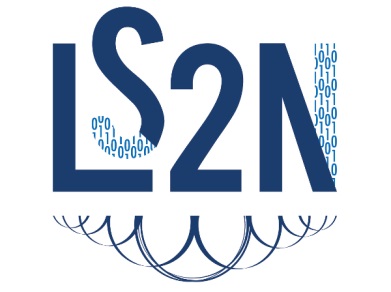
General framework of the activity
The laboratory of digital sciences of Nantes (“Laboratoire des Sciences du Numérique de Nantes : LS2N” in French) is a new Joint Research Unit (UMR 6004) created in January 2017, resulting from the grouping of the IRCCyN (UMR 6597 : Communication and Cyber Research Institute), and LINA (UMR 6241 : Computer Science Laboratory).
With a strong scientific talent at the heart of digital sciences, this large laboratory of 450 people participates fully in the digital revolution of our society on the scientific and technical subjects it implements, but consciously of the societal challenges that this revolution engenders, while remaining curious and openminded to other disciplines.
The complexity of the research objects that we are studying also forces us to adopt a global systemic approach in which computer concerns, automatic control, signal and image processing are interwoven in order to answer the questions asked by open, interactive, communicating and ubiquitous systems. The laboratory is an actor in innovation that values these objects with partners in its environment.
The LS2N is supported by 5 public institutions of Higher Education and Research. It is located in Nantes on 5 geographical sites. Its research activity is structured in 5 areas of expertise and 5 cross-cutting themes.
Specific skills in the MRE field
Control of the electricity transport and connection to the grid of new energy sources (largely renewable) and new charges (electric car). This comes in several challenges:
o the integration of modern means of transport based on power electronics (DC links – HVDC)
o the connection of renewable energies with new specifications concerning the system services of the transport network
o Evolution of modeling / simulation means (construction of large dynamic models, model reduction …)
The competence in complex systems modeling is also applied to the study of logistic flows for the construction of fixed or floating wind farms.
Projects in MRE
In order to build the smart grids of the future, the RTE-Centrale Nantes Chair seeks to bring together the best skills in several scientific disciplines. The unique alliance between automatic control and electrical engineering provides a tremendous opportunity to boost innovation and foster the necessary technological development.
Head of the chair RTE / Centrale Nantes : Bogdan Marinescu
- COMEOL : WEAMEC project
Dynamic reconfiguration control for grid connection of offshore wind generation
- SOFTWIND : WEAMEC project
Development of an experimental platform dedicated to the model testing of floating wind turbine in a wave basin through a software-in-the-loop approach
- OPT EMR : WEAMEC project
Exploratory study for the optimization of the supply chain of bottom fixed and floating offshore wind

